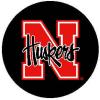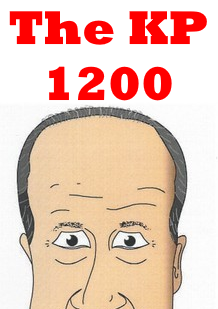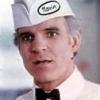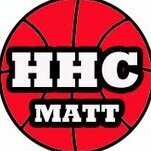Then & Now: Bus Whitehead
Compiled By Dave Brandon
(Photo Courtesy Nebraska High School Sports Hall Of
Fame)
 Nebraska
Nebraska
basketball Hall of Famer Milton "Bus" Whitehead played
for the Huskers from 1948-1950, and was a two time
first-team All-Big Seven pick. In recognition of his
efforts in helping to lead Nebraska to league titles in
both 1949 and 1950, Whitehead is recognized as the
captain of NU's all-time basketball team.
Whitehead recently joined HHC for the latest Sunday
edition of "Then & Now."
HHC: First off, thanks a lot for taking the time
to join us. Should we refer to you as Milton, or Bus?
BW: Bus Whitehead would be great, and I’m happy
to join you.
HHC: We’re happy to have you, Bus. Before we
talk more about you and the teams you played on,
describe to us the kind of coach and man Harry Good was,
since virtually none of our readers know about him.
BW: Well, he was a fellow that started coaching
at Indiana University when Branch McCracken had to go
into the service, and they promised him (McCracken) his
job when he came back. So, he was at Indiana awhile, and
in 1946, when McCracken came back, they replaced Harry
Good and obeyed their promise. So, Harry Good became the
head coach at UNL in 1946-1947.
Harry
was a good basketball coach; he believed in an awful lot
of practice and repetition for his players, and thought
that the more you played with the basketball, the more
you’d get out of it. Sometimes, we’d have three
practices per day, and he was very disciplined in
regards to training. For instance, we were not allowed
to ever drink milk, put ice in our water, or eat
peanuts, stuff like that. He believed in having us be in
good shape with lots of discipline, and having us ready
to go out there on game nights.
HHC: Very interesting, we didn’t know that he
came from Indiana. What about Bus Whitehead; what kind
of player was he?
BW: I was 6’9” and played center, but was not
extremely strong or too much of a jumper. However, I
could run well, as I loved to run the floor with the
other guys. I think I was a better than average shooter,
and I took an awful lot of pride in my defense. I really
took a lot of pride in not letting the other centers
score.
HHC: What was it like playing in the
Coliseum in those early years?
BW: In those days, the Coliseum was the
best floor in the conference, even after Colorado joined
to make it the Big Seven in 1947-1948. The Fire Marshall
never liked to say it held over 9,000, but we generally
always filled the place. It was between 9,000 and 10,000
fans at any game, and they were sitting anywhere they
could find space.
HHC: Who were some of your teammates?
BW: Actually, I had some excellent teammates.
The thing was, when I started in 1945, the War had just
gotten over. So, in ‘46 and ‘47, all these veterans came
back, and as a result, I was always playing with
teammates that were three to five years older than me.
These fellows were mature men, and a lot of them had
just gotten out of the service and gone back to school;
they were very serious on the court and in their
studies. In fact, everybody on our team graduated; we
didn’t have anyone that didn’t.
As far
as some of my teammates, there was a 6’6” forward, who
was extremely rugged and strong, and his name was Joel
Malecek. Anton Lawry played on my teams, as did the
baseball player Bob Cerv. Bob Gates and Joe Brown were
two others, and Harry Good brought with him a player
from Indiana named Claude Retherford. Claude was very
fast, a good shooter, and a very flamboyant player who
took great pride in winning games.
Henry
Cech was also a good player, so my senior year, we had
six very good guards, four tough forwards, and Bob
Pierce and I alternating at center. Our strengths as a
team were rebounding and defense.
HHC: Your first season at Nebraska was in
1947-1948, and you guys finished 11-13 in the first year
of the Big Seven. Talk about what style of play was like
back then in the Big Seven, as far as what types of
offenses and defenses teams ran?
BW: It was mostly all single-post in those days.
Phog Allen was the coach at KU, and he was very
successful that year. Bruce Drake was also successful at
Oklahoma, as was Jack Gardner at Kansas State. Actually,
the Big Seven was a VERY strong conference overall, as
KU won national title in 1952, and in 1951, K-State was
second. Kansas, Oklahoma, and Kansas State were the
teams to beat back then.
HHC: In 1948-1949, you guys finished 16-10 and
in a first place tie in the Big Seven. It was Nebraska's
first winning season in twelve years, you enjoyed
All-Big Seven honors, and your team played in the NCAA
District Game. What do you remember?
BW: I guess that it started out as another
typical year for Nebraska, where we were winning our
fair share of non-conference games. But, we got into the
conference and I think we won our first three or four,
and it gave us a ton of confidence. We said, “Hey, we
can shoot for something better.” So, we tried to step
our game up and play better, and ended up tying with OU.
Then, we had a playoff with them in Kansas City to see
who would go to the NCAA’s, and we beat Oklahoma there.
While we lost to Oklahoma A & M (now Oklahoma State),
who in those days had Hank Iba as their coach, we had a
great year. Oklahoma A & M actually went on to finish
second in the nation.
HHC: In 1949-1950, you guys tied for your second
straight Big Seven title, and you earned your second
consecutive All-Big Seven award. Describe what stands
out from that season?
BW: Well, once again, we got off to a good
start, and we ended up tying with KU and K-State for the
conference title. However, they didn’t have a playoff
game that year since it was a three-way tie, so they
just awarded the title to KU, who went on to the NCAA’s.
But, we had a good year that season, so I couldn’t
complain.
HHC: At the time your career ended, you held
nine scoring records at Nebraska, and were the first
Husker to ever play in the East-West All-Star game at
New York's Madison Square Garden. Talk about what that
meant to you personally?
BW: It was quite an honor. You know, back
in those days, it was quite the privilege to get to play
in that game; Heck, I even got to guard Bob Couzy.
The
thing that made that game so special was that you were
playing with the 23 best seniors in the United States,
so it was an honor that I enjoyed. I remember that they
really took good care of us, as we ate good places, got
to see plays on Broadway, and just had an unforgettable
week. I played for the west, and we were fortunate
enough to beat the east there at Madison Square Garden.
HHC: What are your favorite memories of
your times at Nebraska?
BW: I guess my favorite times were those
with my teammates. I was very fortunate to have some
awfully good human beings as my teammates. We all got
along real well, and enjoyed each other’s company, which
was especially important back in those days, since
travel was much different. In fact, we never did get to
take an airplane anyplace that we played. We went either
by car, bus, or train.
My
sophomore year, we went out and played in San Francisco,
and it was a three-day trip by train out there, and
three days back. We did play a game in Fort Collins
against Colorado State in-between, as well as another
stop, but you know, living together all those days in
the train, and you sit in those depots, and it’s a lot
of time together. So, I think those would have been some
long days had I not enjoyed my teammates so much.
HHC: Whatever happened to coach Harry Good
upon leaving Nebraska in 1954? Did you guys stay in
touch after your career was over?
BW: He stayed in Lincoln after he finished
coaching basketball in 1954. He became the golf coach
for any number of years, and he stayed here until his
health failed him. At that time, he had a daughter who
lived in Minneapolis, so he and his wife Pam moved up
there, and unfortunately his wife died ahead of him,
with him passing on up there in Minneapolis as well.
HHC: Tell us how you launched Whitehead
Oil Company, and what did basketball teach you about
running your very successful business?
BW: When I got out of school, I went to
work for Phillips in the sales department, and I was a
salesman for them for nine years. At the time, I lived
in Lincoln and Hastings, and I always wanted to be a
distributor. But anyway, I had an opportunity to buy out
the Phillips operation in Lincoln in 1959, and that’s
when I started Whitehead Oil Company, which I sold to my
son in 1989.
I think
athletics are good for you, and taught me any number of
things. For one, they teach you to be humble, because I
don’t care how good you think you are, there is always
somebody who will beat you. Also, they teach you
discipline, because if you want to do the job, you’d
better do it right and be prepared.
HHC: And what is Bus Whitehead up to these
days?
BW: I have a company called Whitehead Inc.,
which still has a couple convenience stores that I look
after. Then, I have real estate and some other
investments, and I’m fortunate that my son let’s me
still have an office, right where it’s always been.
(Laughs) So, I get to come down everyday and get away
from the wife and give her some space.
But you
know, its fun, and even though I’m retired and not real
active, there is always something to work on.
HHC: If we set you up an e-mail account at
[email protected] would you be willing to
take e-mails from the fans?
BW: Sure, that would be great. I’ll have to have
someone help me check that, so bear with me, but I’d
love to hear from the fans.
HHC: (Laughs) Awesome. Thanks a lot for
your time, Bus. It's been an honor talking with you.
BW: Thanks a lot for having me. I look forward
to navigating my way around your site as often as I can.<script type="text/javascript" language="javascript">





Recommended Comments
There are no comments to display.
Join the conversation
You can post now and register later. If you have an account, sign in now to post with your account.